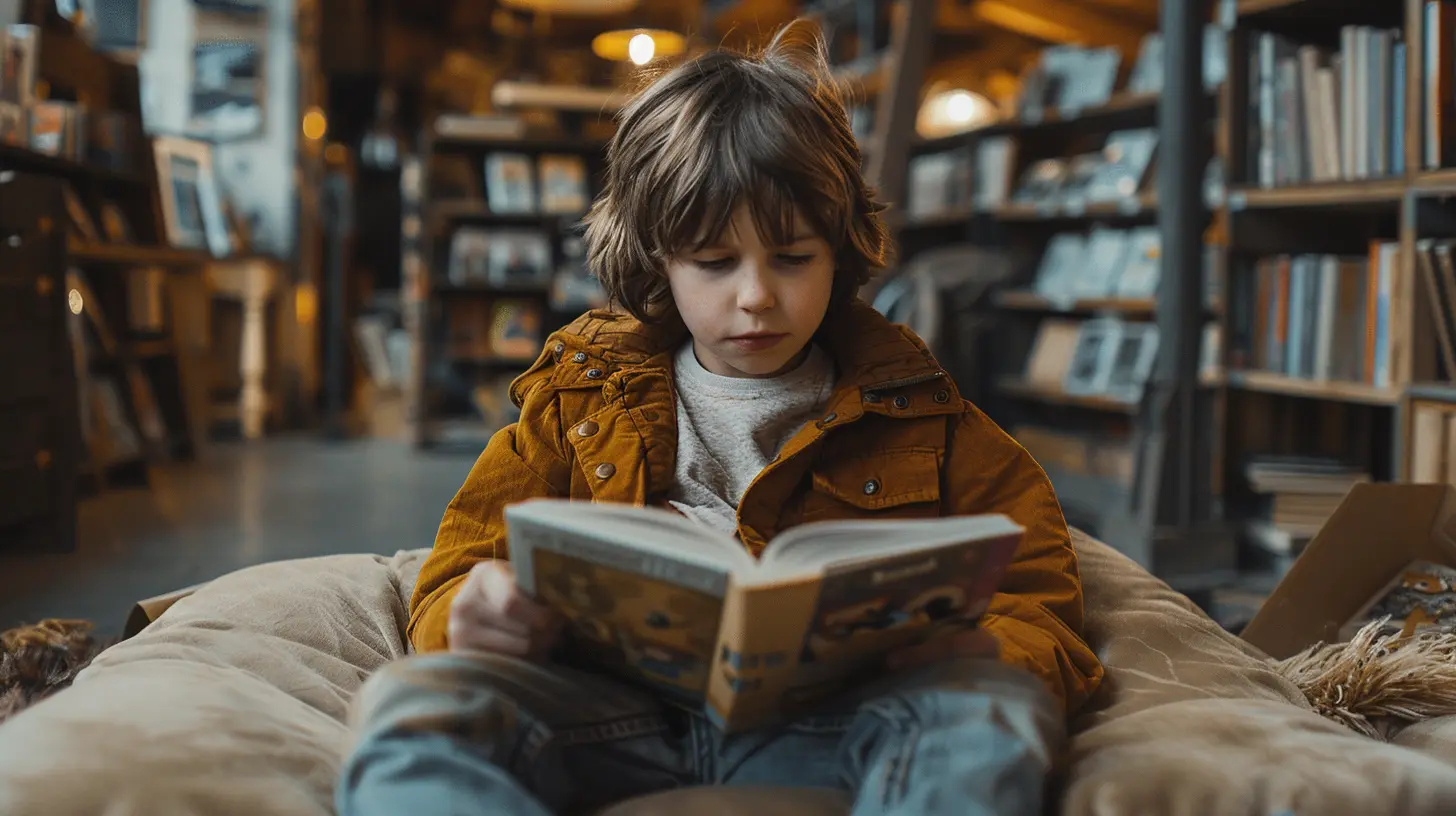Overplanning Childhood: Giving Kids More Downtime
7 July 2025
In today's hyper-scheduled world, childhood has turned into a to-do list. From soccer practice to piano lessons, coding camps to language tutors—our kids are booked solid from sunrise to sunset. At first glance, this might seem great. Who wouldn’t want their child to be the next Mozart or Messi, right?
But here’s the thing: overscheduling can actually do more harm than good. In fact, overplanning childhood may rob kids of the one thing they need the most—unstructured downtime.
Let’s talk about why giving kids more breathing room isn't just a luxury—it's a necessity.
The Modern Childhood Crisis: Too Much to Do, Too Little Time
Let's face it—most of us parents grew up in a different world. We spent entire afternoons riding bikes, building forts out of couch cushions, and playing tag till the streetlights came on. Today, kids often spend their days being shuffled from one structured activity to another, with little to no time just to... be.It’s like childhood has become a 40-hour workweek.
Children today are balancing school, extracurriculars, homework, and even social obligations like birthday parties and sports tournaments. By the time dinner hits, they’re exhausted—and truthfully, so are we.
Why We Overplan (Spoiler: It Comes From a Good Place)
We don’t mean to overwhelm our kids. Really, we don’t.Most of us sign them up for every enriching class and team with the best intentions. We want to give them opportunities. We want them to be competitive, well-rounded, and successful. It’s that whisper in the back of our minds: “If I don’t enroll them in XYZ, will they fall behind?”
Our culture glorifies productivity—not just for adults, but for kids too. Parents are praised for being “involved” and “engaged,” and kids are celebrated for their accomplishments. But what if we’ve taken it too far?
The Hidden Cost of Overplanning
Here’s where it gets real. Too many structured activities can mess with a child’s development in ways we might not expect.1. Burnout is Real—Even for Kids
Imagine living life with no downtime, no moments to daydream or just chill. Kids, like adults, can get burned out. Constant stimulation and expectations can lead to stress, anxiety, and even depression.2. Downtime Is Crucial for Creativity
Some of the greatest ideas come out of boredom. No, seriously.When kids have the space to get bored, they often come up with the most brilliant, creative games and ideas. That’s because boredom activates the brain’s default mode network—a system that supports self-reflection, memory consolidation, and creativity. Basically, boredom is brain fertilizer.
3. Unstructured Play Builds Essential Life Skills
Playing without guidelines teaches kids how to problem-solve, negotiate, and self-regulate. When they create their own games, rules, or imaginary worlds, they’re laying down the foundation for real-world skills like leadership, cooperation, and resilience.These are the kind of skills they won't get from back-to-back classes or organized sports.
4. Family Time Gets Squeezed Out
When every hour is scheduled, even family dinners can feel like rushed pit stops. And let’s be honest, meaningful conversations don’t happen while scarfing down fast food in the car on the way to dance practice. Real bonding takes time—and time is lost in the chaos of overplanning.
How Much Is Too Much?
There’s no magic number here. Every kid is different. Some thrive on structure, while others need more breathing room.But a good rule of thumb? If your child seems constantly tired, irritable, or uninterested in their activities, it might be time to scale back. Resentment builds when kids feel forced into a never-ending stream of tasks.
Ask yourself: Are they excited about these activities, or just going through the motions?
Benefits of Giving Kids More Downtime
Let’s flip the narrative. Let’s talk about what our kids gain when we don’t fill every minute of their time.1. They Learn to Be Self-Directed
Freedom teaches responsibility. When kids have an hour without direction, they learn how to entertain themselves, make choices, and follow their curiosity. These are golden skills for lifelong learning.2. Emotional Regulation Improves
When they’re constantly on the go, kids have no time to process emotions. Downtime gives them the space to recognize how they’re feeling and why. Over time, they get better at managing those big emotions that often come out in less-than-fun ways.3. Better Sleep and Health
Kids who have less on their plates tend to sleep better, eat more relaxed meals, and experience fewer stress-related symptoms. Their bodies and minds get the chance to reset, which is key for healthy development.How to Create More Downtime (Without Feeling Like You're Letting Them Down)
We get it. You don’t want your child to miss out. But adding in downtime doesn’t mean cutting out everything. It just means finding more balance.1. Schedule "Nothing"
Literally block off time in the calendar for nothing. Treat it like any other commitment. This is time for your child to do whatever they feel like—read, nap, doodle, stare at clouds. The goal? No agenda.2. Set Activity Limits
Try applying the “one sport, one passion” rule. Let kids pick one physical activity and one interest-based activity per season. This keeps things manageable and gives them time to breathe.3. Prioritize Open-Ended Play
Stock your home with toys that encourage imagination—like blocks, art supplies, and dress-up clothes. The idea here isn’t to keep them busy, but to give them the tools to direct their own playtime.4. Unplug Often
Screen time is more structured than we think. It follows scripts and patterns. Encourage screen-free hours where your child has to invent their own entertainment. It’s amazing (and kind of magical) what they come up with when the iPad is off.5. Lead by Example
If your schedule is jam-packed, they’ll mirror that lifestyle. Show them that it’s okay to rest, take breaks, and enjoy the moment. Sit and read a book. Take a slow walk. Let them see you value stillness.It's Okay to Do Less
You don’t have to be Superparent. Your child doesn’t have to be fluent in three languages, a violin prodigy, and the star of their swim team by age 10. What they really need? Time. Space. Freedom.So the next time you're tempted to fill that empty Thursday afternoon with "just one more class," take a breath.
Maybe what your child needs most is exactly what we had growing up—a little quiet, a lot of imagination, and the sweet, sweet joy of doing absolutely nothing.
Final Thoughts
Overplanning childhood may seem like a modern-day badge of honor, but it often comes at the cost of joy, curiosity, and natural development. Giving kids more downtime isn’t about being lazy or uninvolved. It’s about trusting in the power of simplicity. It’s about believing that sometimes, the best thing we can offer our kids isn’t another class, another activity, or another enrichment—but a quiet afternoon and the freedom to just be a kid.Let’s stop managing our children’s lives like corporate calendars. Let’s give them the gift of space. It might just be the most valuable lesson we teach them.
all images in this post were generated using AI tools
Category:
Parenting MistakesAuthor:

Austin Wilcox
Discussion
rate this article
2 comments
Thistle McAllister
In a world that values productivity, remember: unstructured play fosters creativity and resilience. Embrace downtime; it lays the foundation for a well-rounded and happy childhood.
November 25, 2025 at 5:18 PM

Austin Wilcox
Thank you for highlighting the importance of unstructured play! It truly is essential for fostering creativity and resilience in children.
Quinn McGuffey
“Let’s be real: over-scheduled kids are just mini adults with no fun. Downtime isn’t a luxury; it’s essential! Let them roam, imagine, and just be kids. Life’s not a LinkedIn profile, after all!”
July 24, 2025 at 3:12 AM

Austin Wilcox
I completely agree! Downtime is crucial for creativity and genuine childhood experiences. Letting kids explore freely allows them to develop in a balanced way.


